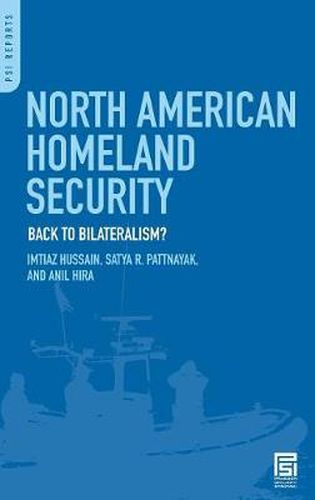Readings Newsletter
Become a Readings Member to make your shopping experience even easier.
Sign in or sign up for free!
You’re not far away from qualifying for FREE standard shipping within Australia
You’ve qualified for FREE standard shipping within Australia
The cart is loading…






Did 9/11 revive a North American guns-butter trade-off? Established in the largest administrative overhaul since World War II, the Department of Homeland Security was charged with keeping the United States safe within a wider security community, but confronted the Washington Consensus-based Western Hemisphere free trade movement, beginning with the North American Free Trade Agreement (NAFTA) and extending to the Central American Free Trade Agreement (CAFTA) in 2003, to materialize a Free Trade Area of the Americas (FTAA) compact. Whether 9/11 restrictions impeded these trade-related thrusts or not, embracing neoliberalism permitted Canada and Mexico to pursue their own initiatives, such as proposing free-trade to the US-Canada in 1985, Mexico in 1990, but, as during the Cold War, security imperatives ultimately prevailed.
This work investigates Canada’s and Mexico’s Department of Homeland Security responses through three bilateral studies of policy responses along comparative lines, case studies of security and intelligence apparatuses in each of the three countries, and a post-9/11 trilateral assessment. Ultimately, they raise a broader and more critical North American question: Will regional economic integration continue to be trumped by security considerations, as during the Cold War era, and thereby elevate second-best outcomes, or rise above the constraints to reassert the unquenchable post-Cold War thirst for unfettered markets replete with private enterprises, liberal policies, and full-fledged competitiveness?
$9.00 standard shipping within Australia
FREE standard shipping within Australia for orders over $100.00
Express & International shipping calculated at checkout
Did 9/11 revive a North American guns-butter trade-off? Established in the largest administrative overhaul since World War II, the Department of Homeland Security was charged with keeping the United States safe within a wider security community, but confronted the Washington Consensus-based Western Hemisphere free trade movement, beginning with the North American Free Trade Agreement (NAFTA) and extending to the Central American Free Trade Agreement (CAFTA) in 2003, to materialize a Free Trade Area of the Americas (FTAA) compact. Whether 9/11 restrictions impeded these trade-related thrusts or not, embracing neoliberalism permitted Canada and Mexico to pursue their own initiatives, such as proposing free-trade to the US-Canada in 1985, Mexico in 1990, but, as during the Cold War, security imperatives ultimately prevailed.
This work investigates Canada’s and Mexico’s Department of Homeland Security responses through three bilateral studies of policy responses along comparative lines, case studies of security and intelligence apparatuses in each of the three countries, and a post-9/11 trilateral assessment. Ultimately, they raise a broader and more critical North American question: Will regional economic integration continue to be trumped by security considerations, as during the Cold War era, and thereby elevate second-best outcomes, or rise above the constraints to reassert the unquenchable post-Cold War thirst for unfettered markets replete with private enterprises, liberal policies, and full-fledged competitiveness?